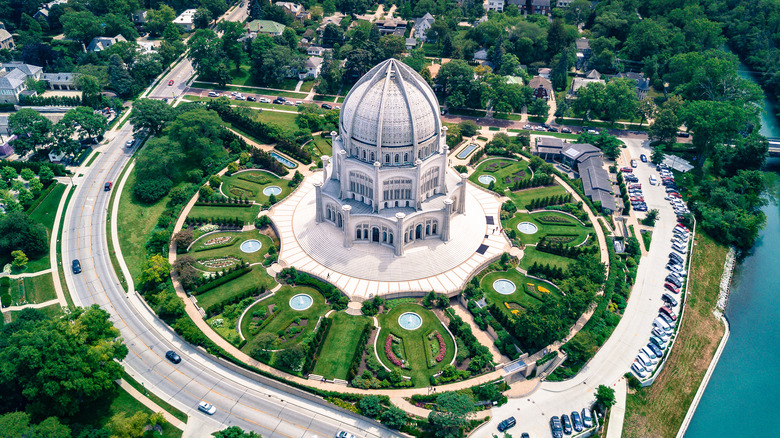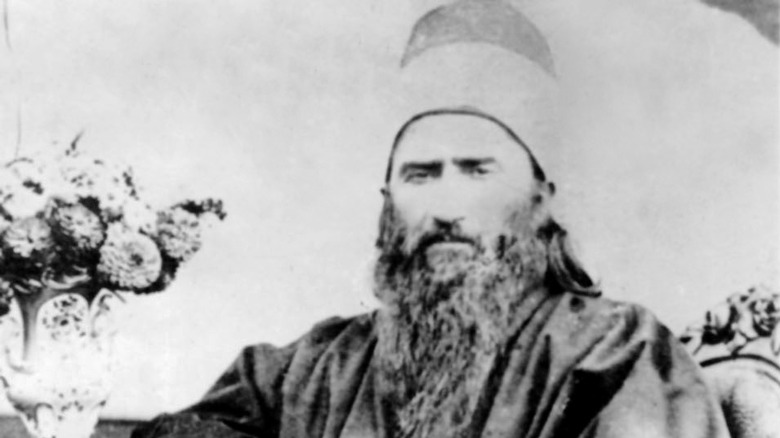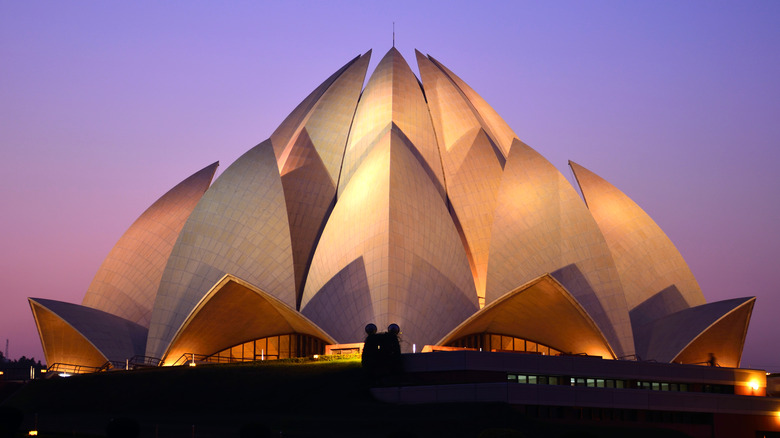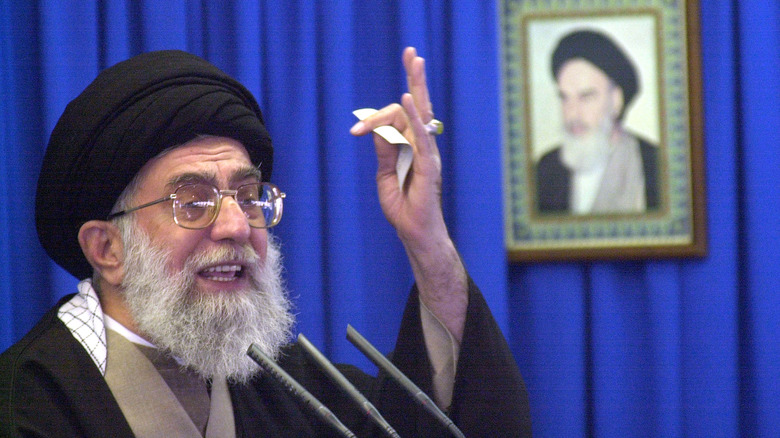What Is The Baha'i Faith And What Do Followers Believe?
The Baha'i faith arose in the 19th century. It is primarily based upon the writings of the Persian (Iranian) prophet Baha Allah. Baha'i is in effect the "sequel" to an earlier religious movement — the Babi faith, which "corrected" Islamic tenets with a new philosophical system.
Although Babism sprang from Shi'ite Islam, many Baha'i tenets and beliefs have more in common with modern New Age ideas than anything else. Perhaps for this reason, the Baha'i faith rapidly grew in popularity in the optimistic atmosphere of the 1960s. Believers put a strong emphasis on equality and the collective power of mankind to do good and cooperate with each other. Today the Baha'i even argue that world peace is on the horizon — as part of humanity's collective spiritual evolution.
Baha'i adherents believe in the total harmony of all the world's religions including the three Abrahamic faiths, and they are wedded to the idea that man has spiritually progressed through the ages. Unfortunately, however, their belief in harmony is not shared by others — members of the Baha'i faith have been repeatedly persecuted across the Middle East since the movement began.
The Babi movement
To understand the Baha'i faith it is first necessary to briefly delve into the history of a little-known sect that sprang from Shi'ite Islam. In the 1840s, an enigmatic figure, known simply as "the Bab" (literally the "gate"), declared that he was a spiritual gateway to the long-awaited "12th imam." Some Muslims believe the 12th imam is supposed to be the reincarnation of Muhammad Al-Mahdi — a figure whose arrival on earth will supposedly bring about the total victory of the Muslim faith and create a golden age.
Eventually, the Bab would claim to be not just a portal but the actual imam himself, and despite his Shi'ite roots, he effectively replaced Islam with his own belief system through his writings. Having started life as a simple wine merchant from Shiraz, the Bab gained a lot of attention and admiration from some quarters before he was finally shot by a firing squad and thrown in a moat.
This might have been the end of Babi philosophy, but before being executed the Bab predicted that he would have a successor (via British Library): "He whom God would make manifest." Such a person arrived in the form of Baha Allah, a Babi follower who was exiled to Ottoman Iraq in the 1850s. Baha Allah changed and improved upon Bab's original teachings and can be identified as the founder of the Baha'i faith.
[Featured image by http://www.zamaneh.info/ via Wikimedia Commons | Cropped and scaled]
Embracing radical equality
The message of the Baha Allah was quite radical for its time, and the Baha'is put an unusually heavy emphasis on the equality and unity of all mankind. Abdu'l Baha, the oldest son of Baha Allah and an important figure in the early Baha'i faith, is famous for saying (via The Baha'i Faith), "The world of humanity has two wings — one is women and the other men."
The Baha'is hold that all nations and all races are equal and they stress equality between men and women. In the name of equality and to prevent corruption there is also no Baha'i priesthood — no arbitrary hierarchy for believers to climb. When representatives are needed to lead at the national or international level, members elect a candidate between them, and no canvassing or political jostling is allowed.
For the faithful, the removal of all prejudice against others is critical to spiritual progress. "Prejudices of religion, race or sect destroy the foundation of humanity. All the divisions in the world, hatred, war, and bloodshed, are caused by one or other of these prejudices," Abdu'l Baha wrote in "Paris Talks."
The progress of man
Perhaps more interesting than their faith in God is the Baha'is' faith in other people. The Baha'i think about mankind as a collective that has gone through a series of stages. The prophets of all the world's major religions — Jesus, Zoroaster, Muhammad, etc. — are acknowledged as having provided much-needed wisdom to mankind, by promoting faith in the one true god. However, they are also just stepping stones in a longer process of growth for humanity. Different periods in human history required different prophets and different revelations.
Humans are constantly progressing, and although the Baha'i do have holy writings, they believe that religious dogma is potentially dangerous. Each individual must ultimately search for truth on their own and scientific discovery can be part of this search. The agreement of scientific principles with religious faith is stressed, and intellectual inquiry is held up as a virtuous activity that can bring us a better world when combined with religious faith.
The Baha'i faith has such an optimistic view of mankind's continual progress that in 1985, the Baha'i Universal House of Justice declared that humanity will inevitably reach an era of world peace as we evolve in the future. The prophet Baha Allah advocated for the establishment of one world parliament to achieve this end — known as "the parliament of man." Today the Baha'i believe that the existence of the U.N. is a sign we are headed in the right direction.
Religious practices
The Baha'i faith rejects ritual practices and has few traditions. The Baha Allah believed that religious ritual too often becomes the focus of religious life. Instead, prayer and group discussion are at the heart of the Baha'i tradition.
Baha'is meet regularly to talk or hold celebrations, and these usually involve prayers. However, there is no uniformity between gatherings held in different places and no set rules. On an individual level, daily prayer is encouraged, and there are a few obligatory prayers written by the Baha Allah himself that should be recited once a day at different times. The faithful also have many feast days, during which the community comes together to celebrate, and some adherents also like to undertake pilgrimages to the shrines of the religion's founders.
Other Baha'i obligations have a lot in common with the other Abrahamic religions — they are supposed to be monogamous and should not drink alcohol or consume drugs. Similar to Islam, followers undergo a period of fasting that takes place over 19 days and is broken each day before dawn and after sunset.
Ongoing persecution
Since the 19th century, the Baha'i faith has spread all over the world, and in many places, adherents have faced discrimination and sometimes violent repression. In the eyes of many Muslims, the Baha'i are technically heretics, who have strayed from the correct path by denying Muhammad is the final prophet. Baha Allah himself was persecuted while he was alive and kicked out of Persia by the religious authorities there. Exiled to the Ottoman Empire, he didn't fare much better and eventually died in an Ottoman prison in Palestine.
In Iran, attitudes have not progressed much since the 19th century. The ayatollah's regime still persecutes members of the faith today. Amnesty International reports that as recently as 2022, believers have been subject to a ferocious round of arbitrary arrests, beatings, and systematic land confiscations. According to the U.S. Department of State, Baha'i is the largest non-Islamic faith group in Iran today, and persecution is a regular occurrence.
In Yemen too, Baha'i lives are at risk in the modern era, and troubling sectarian violence in the country has resulted in a threatening atmosphere for the group. In 2018 for example, the leader of the Yemeni Houthi faction, Abdel-Malek al-Houthi, suggested that the "infidel" group should be met with violence (per LSE). Sadly many Houthi have obliged him. Baha'i faithful have been arrested, exiled, and attacked, and in 2023, a story broke that Yemeni Houthi militants broke into a Baha'i religious meeting and "disappeared" those in attendance (via Human Rights Watch).





